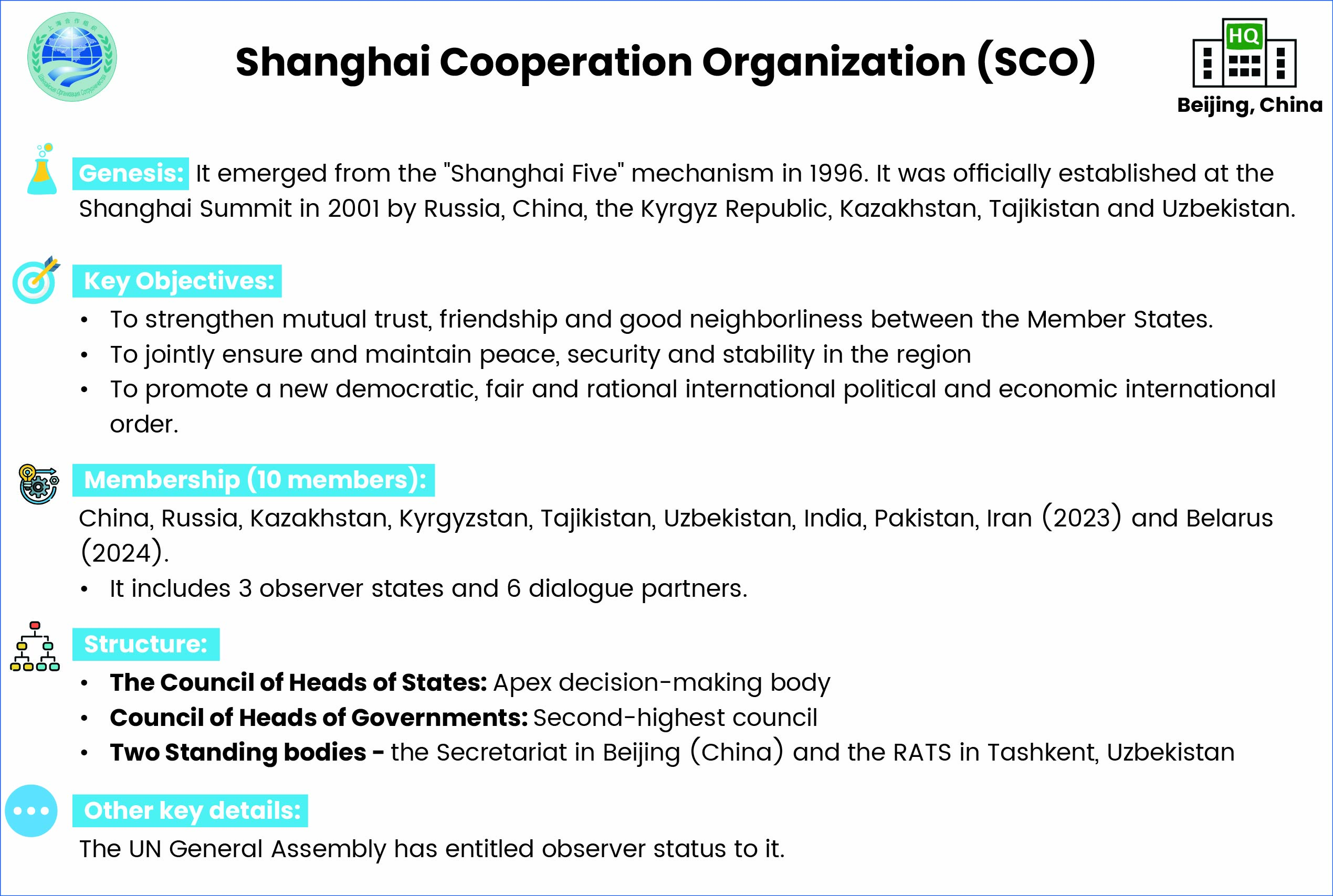Why in the News?
Recently, India has refused to sign a joint declaration at the Shanghai Cooperation Organisation (SCO) Defence Ministers' meeting in Qingdao, China.
More on the News
- Due to India's refusal the meeting concluded without a joint communique.
- According to the SCO Charter, the group makes decisions by aggreement without a vote, and these decisions are considered adopted if no member state raises objections.
- India in SCO granted observer status in 2005 and elevated to full membership in 2017.
Why did India refused to sign a Joint Declaration?
- Double Standard for Terrorism: In the document, there was no mention of the recent Pahalgam attack but included militant activities in Balochistan.
- India emphasized that SCO should not hesitate to criticize nations that promoted cross-border terrorism.
- Non-Negotiable Core Principles: India has consistently maintained that peace and terrorism cannot coexist, and this principle remains non-negotiable even in multilateral forums.
India's Strategic Opportunities within the SCO Framework
- Engaging Central Asia/Geopolitical Outreach: SCO forum can be used to improve relations with Central Asian Republics (CARs).
- This complements the Connect Central Asia Policy.
- Economic and Energy Cooperation: E.g., In 2022 Kazakhstan produced the largest share of uranium from mines (43% of world supply)
- Promoting Regional Connectivity: E.g. International North-South Transport Corridor (INSTC)
- Engaging with Pakistan and China: SCO acts as a diplomatic channel to maintain dialogue despite bilateral tensions.
What are India's concerns regarding SCO?
- China's multilateral power play: China aims to transform the grouping into a China-led multilateral forum for regional geo-economic and strategic interests.
- E.g., Help BRI gain regional prominence.
- Expansion Dilemma: Recently Belarus joined SCO; this raises its global profile but dilutes regional focus.
- SCO was instituted with the sole focus on Central Asia. Expansion could potentially drive members to seek alternative cooperation formats.
- SCO's Effectiveness: The decisions of the SCO lack the necessary executive guarantee and as result, this organisation, like the Non-Aligned Movement (NAM), has become merely a place to discuss and announce positions and views.
- Perceived Anti-Western Group: SCO is sometimes viewed as an anti-western block, especially with the ongoing geopolitical tensions involving China, Russia, and Iran with the West.
How India balances Strategic Autonomy with multilateral engagement in the SCO?
- Prioritizing Strategic National Interests over Chinese Interest: At the SCO 2023 summit in Pakistan, India refused to sign the paragraph that supported China's Belt and Road Initiative (BRI).
- This also shows how India is tackling Pakistan-China Axis Agenda in a group.
- Selective Participation with Principles: E.g., SCO's Regional Anti- Terrorist Structure (RATS) coordinates counter-terrorism efforts among member states.
- Promoting Development-oriented platform: E.g., SCO Sub-Group on Cooperation in Traditional Medicine and Startups and Innovation
- This will ensure that SCO is not viewed as anti-western block.
- Leveraging close Relationship with Russia: E.g. India and Russia cooperate on core agenda items in the SCO.

Role of SCO in Reshaping Global Multilateral Order
- SCO's global pivot: Covers approximately 80% of the Eurasian landmass and represents about 42% of the global population.
- Rising Economic Clout: Member countries contribute around 25 % of the global GDP.
- SCO's challenging Western Domination: SCO is emerging as an alternative to multilateral forums established by the Western countries to fulfill their interest.
- Filling the Security Void: SCO addresses Afghanistan's security vacuum left by NATO alliances (led by the US), in 2021.
- Afghanistan Contact Group (ACG) was created by SCO in 2005 to maintain regional cooperation with Kabul.
Conclusion
India views the SCO as a vital platform for regional engagement, especially in Central Asia, but remains cautious of its China-centric tilt. India's balanced approach allows meaningful participation without compromising core values.




